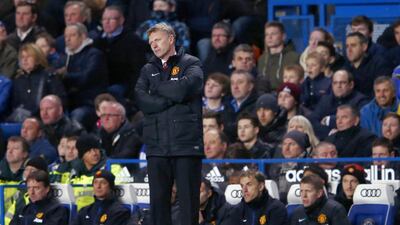It is never a good sign when the stands hold more stardust than a supposedly champion side.
In a season of unusual indignities, it was another indication of Manchester United’s decline that the plush seats at Stamford Bridge featured more luminaries, albeit spread across two sports, than David Moyes’s team. David Beckham and Kevin Pietersen may be skilled self-publicists but they retain a certain glamour.
United lack it. Theirs is a mundane mediocrity. Shorn of Robin van Persie and Wayne Rooney, the two men with the “X” factor, they exited the title race.
Fourteen points behind Arsenal, 12 adrift of third-placed Chelsea, even six from fifth position, their demise is evident in every league table. This is a limited team whose limitations have become apparent whenever they have faced their peers. They have one win in 10 league games against the top nine, a mere five points against the rest of the elite eight.
This is Moyes’s United, the side that fails the stiffest examinations and whose hopes rest squarely on two pairs of shoulders. Their flagship victory, against Arsenal, came courtesy of Van Persie. He tended to be the decisive influence when they prevailed in major matches last year, too.
Rooney also has a respectable record in season-defining fixtures. They are living – or, at the moment, limping – proof that big games demand big talents. United have too few.
A comparison of the team sheets prompted the question of how many would merit a place in the Chelsea side. Two? Three? It was hard to make a case for four of United’s men in a joint 11, even before a chastening defeat.
If the initial analysis was that both sides might suffer from a striking shortage, Chelsea emerged the stronger in that department, too. United have two of the most feared forwards in the world, but both are sidelined; Chelsea two, in Fernando Torres and Samuel Eto’o, who used to belong in that bracket.
Yet Jose Mourinho is conjuring contributions from his ageing frontmen. The Cameroonian, who scored against United in the 2009 Uefa Champions League final, delivered a hat-trick that rendered the visitors’ bright start the falsest of false dawns. The early attempt to compensate for the gulf in talent with an up-tempo, energetic approach suggested United were liberated by their status as underdogs.
Yet they lack the power to sustain such spurts. After Eto’o opened the scoring, United settled into their familiar pattern of humdrum blandness, until Javier Hernandez began his bright cameo.
Without the physical power or the passing philosophy to dominate, they are reliant on individual inspiration. Only Adnan Januzaj threatens to offer any; a Moyes side has not been this dependent upon a teenager since his Everton team, including Rooney, flirted with relegation in 2003/04.
The collective malaise is such that too many of the supporting cast no longer even boast the reliability required. Phil Jones let Eto’o escape his attentions too easily for the opener. Rafael da Silva switched off after a corner was half-cleared before the Cameroonian’s second goal. Jonny Evans lost Gary Cahill when Eto’o completed his hat-trick.
The days when United’s squad players were the scourge of fancied sides – remember when Park Ji-sung, Darren Fletcher and Anderson were all Arsenal’s nemeses at the same time? – are long gone.
Now, United’s pool is packed with players Moyes scarcely seems to trust. Rio Ferdinand is rarely seen, Wilfried Zaha spotted still less often and his patience with Tom Cleverley seemed exhausted when the midfielder conceded a crucial penalty at Sunderland. Shinji Kagawa lingered unused on the bench but, given his record against the best, it is hard to fault Moyes for his lack of faith.
He was supposed to be United’s third superstar. Instead, like the biggest draw of all, he had a watching brief. Once again, Sir Alex Ferguson was sat in the stands, next to the singer Mick Hucknall. Simply Red was an apt tag for Ferguson’s United. Now it is simply dreadful for them.
sports@thenational.ae
Follow us on Twitter @SprtNationalUAE


